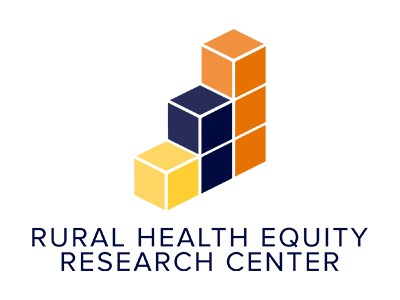News and Events
Balio featured on Exploring Rural Health podcast

Casey Balio, PhD, Research Assistant Professor at East Tennessee State University's Center for Rural Health and Research and part of the ETSU/NORC Rural Health Equity Research Center, is the featured guest on the May edition of the “Exploring Rural Health” podcast. In the interview, Balio discussed the RHERC’s recent study on the use of the Area Deprivation Index (ADI) in rural health research.
“The ADI is a really important area-level measure of deprivation that is being used by federal, state, and local agencies as well as healthcare organizations to align resources with need. As such, the Federal Office of Rural Health Policy (FORPH) was interested in learning more about what we know and don’t know about the ADI,” said Balio. “This discussion really just scratches the surface of what we’re finding in this space, and we can’t wait to share more soon.” Read more...
RHERC study finds grant guidelines do not align with population needs

A new study by the East Tennessee State University (ETSU)/NORC Rural Health Equity Research Center finds that current block grant funding guidelines do not align with population needs, and states face additional challenges in actively taking steps to ensure that funding is allocated equitably. Dr. Casey Balio is lead author of the article in Public Health Reports.
“This paper was part of a larger project conducted through our Rural Health Equity Research Center, funded by HRSA’s Federal Office of Rural Health Policy, about how federal block grants funds are allocated and used, particularly the implications for rural communities,” said Balio. “In this study, our team looked at associations between state allocations and measures of state-level need. We found that allocations across five federal block grant programs are based on historic funding formulas, many of which no longer reflect the needs of states.” Read more...
ETSU/NORC study finds rural patients face greater challenges to substance use disorder
treatment

A new analysis from the East Tennessee State University/NORC Rural Health Equity Research Center finds that people living in rural areas of the United States face greater challenges accessing substance use disorder (SUD) treatment than people living in urban areas. The ETSU/NORC Rural Health Equity Research Center is a partnership between the Addiction Science Center and Center for Rural Health and Research, in the ETSU College of Public Health.
The study shows that rural residents are four-and-a-half times more likely than urban residents to be admitted to inpatient treatment through a court order or by law enforcement and nine times less likely to have access to buprenorphine, a medication for opioid use disorder that suppresses withdrawal and relieves opioid-related cravings in a safe and controlled way. Read more...
Mental Health Treatment Is Becoming Less of a Taboo Subject with Rural Residents,
New Study Shows

New research from the Rural Health Equity Research Centers at East Tennessee State University finds that rural residents are less likely to have negative attitudes toward those with mental health illnesses than previously thought. Prior studies had found that there was more of a stigma around mental illness in rural communities.
According to researchers Kate Beatty and Michel Meit, previous studies found that perceived prejudice against rural residents with mental health concerns not only reduced treatment but that rural residents felt that treatment wouldn’t work. For instance, a study of Appalachian parents of children with mental health concerns in 2015 found that 28% of parents worried about others finding out their child was being treated for a mental illness, compared to 22% of parents in urban areas. Another study that same year found that older rural residents have higher levels of public and self-stigma than older adults in urban areas. Read more...
Examining stigma and mental illness in rural communities

The East Tennessee State University/NORC Rural Health Equity Research Center recently released a policy brief examining the burden of public stigma associated with mental illness in the rural United States.
“Stigma is a widely recognized barrier to receipt of health and mental health services,” said Dr. Kate Beatty, a member of the Rural Health Equity Research Center (RHERC) and a faculty member in the ETSU College of Public Health. Read more...
Mike Meit Interviewed by the Atlantic

Vaccine hesitancy is now the chief focus for rural-health experts. They have an obligation to change minds, and fast. But persuasion works only with trustworthy messengers, such as local leaders, physicians, and pharmacists—people who already have relationships and friendships with community members, who share similar values, and whose children go to school together.
“Rather than have these mass-vaccination sites through government-funded health departments with the National Guard” overseeing operations, health officials need to send vaccines straight to places such as doctors’ offices, churches, and familiar local clinics, Michael Meit, the research director at East Tennessee State University’s Center for Rural Health and Research, told me. “It’s those relational pieces that are so, so important in our rural communities.” Read more...
Alana Knudson Awarded National Rural Health Association’s Outstanding Researcher Award
Alana Knudson, director of NORC’s Walsh Center for Rural Health Analysis, is the recipient of the National Rural Health Association’s (NRHA) Outstanding Researcher Award. Knudson is nationally known as leader in developing and evaluating Centers for Medicare & Medicaid Services (CMS) and Federal Office of Rural Health Policy (FORHP) demonstration projects and her teams have produced impactful research to improve sustainable rural access to high quality services.
“Alana is beloved by all who know her and is widely regarded within the research community as one of the foremost champions for rural communities and rural people,” says NORC senior fellow and director of research and programs at East Tennessee State University, Michael Meit. Read more...
More Appalachians Are Dying from ‘Deaths of Despair.’ And COVID-19 Is Making It Worse.

In November, the Appalachian Regional Commission released a report titled “Appalachian Diseases of Despair,” from research conducted by the Walsh Center for Rural Health Analysis at the University of Chicago and the Center for Rural Health and Research at East Tennessee State University. The researchers found that between 2012 and 2017, the overall mortality rate throughout the whole of Appalachia climbed by almost 10 percent, while in the rest of the country it increased by just under 6 percent.
This rise, the authors note, coincided with the surge in opioid overdose deaths, and it further widened the gap between the mortality rate within Appalachia and elsewhere, following a decade-plus period in which overall mortality had declined outside Appalachia but increased within the region. Read more...